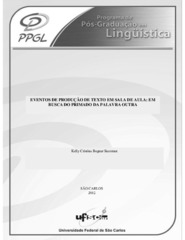Mostrar el registro sencillo del ítem
Eventos de produção de texto em sala de aula: em busca do primado da palavra outra
| dc.contributor.author | Sacoman, Kelly Cristina Bognar | |
| dc.date.accessioned | 2016-06-02T20:25:16Z | |
| dc.date.available | 2012-12-20 | |
| dc.date.available | 2016-06-02T20:25:16Z | |
| dc.date.issued | 2012-12-11 | |
| dc.identifier.citation | SACOMAN, Kelly Cristina Bognar. Eventos de produção de texto em sala de aula: em busca do primado da palavra outra. 2012. 187 f. Dissertação (Mestrado em Ciências Humanas) - Universidade Federal de São Carlos, São Carlos, 2012. | por |
| dc.identifier.uri | https://repositorio.ufscar.br/handle/ufscar/5754 | |
| dc.description.abstract | This work is an investigation about the texts productions written by children of the second year of elementary school in a public school located in the city of Bauru, in order to seek in the process of construction of the sense of the texts the singularities that point to the relation of the word itself with the word another. To this end, we based ourselves on the theory and design of language of Mikhail Bakhtin, as well as on the ponziana and geraldiana theories with respect to the enunciative treaty of language. In this context, we aimed to understand how occurred the literacy process in what circumscribes the practices of texts production and reading, as well as investigate the conceptions of subject that underlie the different practices of reading and writing in literacy. In addition, we conceive the production practice of written text as a discursive activity that correlates sense (implied) and situation (life) in a unique and singular event. We had as goal, also, think about the senses and subject formation processes in the production of language. With basis on the investigative principles of indiciary paradigm and the methodological reflections in Bakhtin Humanities, we try to highlight in a written narrative production, namely, the children's tale Little Red Riding Hood, how the child assumes a active responsive position on its re-telling. In the narrated discourse there are displacement movements that point to a emotive-valuation work, in which stands out the uniqueness of the child; in the meeting between reported word and word that reports, the child's production is characterized as a translation work. | eng |
| dc.format | application/pdf | por |
| dc.language | por | por |
| dc.publisher | Universidade Federal de São Carlos | por |
| dc.rights | Acesso Aberto | por |
| dc.subject | Linguística | por |
| dc.subject | Produção de textos | por |
| dc.subject | Ensino - aprendizagem | por |
| dc.subject | Alfabetização | por |
| dc.subject | Enunciado | por |
| dc.subject | Dialogismo | por |
| dc.subject | Palavra outra | por |
| dc.subject | Teaching to read and write | eng |
| dc.subject | Text production | eng |
| dc.subject | Teaching-learning | eng |
| dc.subject | Utterance | eng |
| dc.subject | Word another. | eng |
| dc.title | Eventos de produção de texto em sala de aula: em busca do primado da palavra outra | por |
| dc.type | Dissertação | por |
| dc.contributor.advisor1 | Brito, Maria Isabel de Moura | |
| dc.description.resumo | Este trabalho é uma investigação acerca das produções de textos escritos por crianças do 2° ano do Ensino Fundamental, de uma escola pública do município de Bauru, tendo em vista buscar, no processo de construção do sentido dos textos, as singularidades que apontam para a relação palavra própria com a palavra outra. Para tanto, fundamentamo-nos na teoria e concepção de linguagem de Mikhail Bakhtin, bem como nas teorias ponziana e geraldiana no que tange ao tratado enunciativo da linguagem. Nesse contexto, objetivou-se compreender como se deu o processo de alfabetização no que circunscreve as práticas de produção e leitura de textos, bem como investigar as concepções de sujeito que subjazem as diferentes práticas de leitura e escrita na alfabetização. Além disso, conceber a prática de produção de texto escrito como atividade discursiva, que correlaciona sentido (subentendido) e situação (vida) em um evento único e singular. Foi objetivado, ainda, refletir sobre os processos de constituição de sentidos e sujeito na produção da linguagem. Com base nos princípios investigativos do paradigma indiciário e nas reflexões metodológicas em ciências humanas bakhtinianas, procuramos evidenciar em uma produção escrita de narrativa, a saber, o conto infantil Chapeuzinho Vermelho, o modo como a criança assume uma posição responsiva ativa no seu reconto. No discurso narrado há movimentos de deslocamento que apontam para um trabalho emotivo-valorativo, em que sobressai a singularidade da criança; no encontro entre palavra reportada e palavra que reporta a produção da criança se caracteriza como um trabalho de tradução. | por |
| dc.publisher.country | BR | por |
| dc.publisher.initials | UFSCar | por |
| dc.publisher.program | Programa de Pós-Graduação em Linguística - PPGL | por |
| dc.subject.cnpq | LINGUISTICA, LETRAS E ARTES::LINGUISTICA | por |
| dc.contributor.authorlattes | http://lattes.cnpq.br/8256580370732983 | por |
